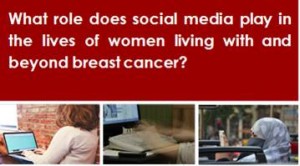Participant Information Sheet – Focus group
What role does social media play in the lives of women living with and beyond breast cancer?
Thank you for asking for more information about this research study. Before you decide whether to take part or not, it is important to understand why this research study is being carried out and what it will involve. Please read the information provided about the study, take your time to consider it and think about what it will entail for you. You are welcome to discuss the study with others if you wish. If you would like further information about the study or would like to clarify any aspects of your involvement in the research, please contact me using the contact details below.
What is the purpose of this study?
The central concern of this study is to understand what role social media use plays or does not play in the lives of women who are living with and beyond breast cancer. Previous research indicates that breast cancer is a phenomenon which has a significant ‘social’ presence online with over 100 million results searchable via Google (Quinn et al., 2013) and over 600 different Facebook groups (Bender et al. 2011) yet few studies have explored the role social media plays in the lived experiences of those living with and beyond breast cancer. With the number of women living with and beyond breast cancer in the UK set to rise substantially within the next fifteen years (Maddams et al. 2012), it is timely to explore how and why women use social media in relation to their breast cancer experiences.
Why have we contacted you?
We are inviting women over the age of 18, who have at some stage of their lives been diagnosed with breast cancer. We are looking to invite women to come and share their experiences in a focus group of up to eight people. We can accommodate groups, if you would prefer to share your experiences as a small group of friends.
Do I have to take part?
It is entirely up to you whether to take part. Taking the time to read all of the information provided about the study will help you come to an informed decision. If you decide to participate, you will be asked to complete and sign a consent form – a copy of which I have attached so you can see what is involved. Remember, however that if at any time during the study you decide you no longer wish to participate, you can withdraw or end your participation without needing to give a reason.
What do I have to do?
If you choose to take part, you will be invited to attend a focus group session. This is likely to at The University of Salford, Frederick Road campus. It is anticipated that the focus group will be attended by between 6 – 8 women. The focus group will be informal and relaxed and a number of questions will be asked about how you use social media platforms. It is anticipated that the focus group session will last for approximately 60 minutes. We would also like you to complete a brief questionnaire relating to your breast cancer diagnosis and social media use.
What are the possible disadvantages of taking part?
We recognise that each individual’s experiences of living with and beyond breast cancer are different and talking about these experiences can be difficult at times. If you do decide to participate in a focus group session, you can withdraw at any time or you can choose not to answer questions that you feel are too personal for you. If you would like to participate but feel a focus group is not for you, then it may be possible to set up a one to one interview with you which would be conducted using the same questions and visual stimuli as used in the focus groups. Contact me to discuss this option, if this is something you are interested in.
What are the possible benefits of taking part?
This is the first study that we know of, in the UK, seeking to understand women’s experiences of using social media platforms in relation to their experiences of living with and beyond breast cancer. As such it is an opportunity to talk about your own experiences, whether you use social media or not. I believe this study could provide new insight into ways in which women support their own psychological health post treatment. If this is the case, this information could help improve post treatment support for others.
Will my involvement in the study remain private/confidential?
All information that is collected, as part of this research study, will be kept strictly confidential. Names of individuals involved in the study will be kept on a password-protected computer, accessed only by the researcher. It would be my intention to not use your name in this study. However, should you wish to be named, then this can be accommodated with your written consent. I intend to transcribe all the information collected myself however, there is a small chance this work may be carried out be external transcribers.
What will happen to the results of the research study?
It is anticipated that the results of this study will be shared with health professionals and potentially breast cancer related organisations. Additionally, the study and its results will be presented at academic conferences and written up for inclusion in academic journals. We offer anonymity to all research participants. You will not be named or identified in any of the formal outputs unless you have specifically request to be named and provide that request in writing.
Who has reviewed this study?
This study has been reviewed and approved by The University of Salford, School of Health Sciences Ethics Committee (HSCR 15-71).
What happens now?
If you would like to share your experiences in a focus group or would like more information about the study, contact Cathy Ure at c.m.ure@edu.salford.ac.uk or on (phone number).
What if there is a problem?
If you have a concern about any aspect of this study, you should ask to speak to the researchers’ Supervisor who will do their best to answer your questions: Dr. Adam Galpin: t: 0161 2957146. Email: a.j.galpin@salford.ac.uk
If you remain unhappy and wish to complain formally you can do this through:
Anish Kurien Research Centre’s Manager, University of Salford, G.08, Joule House, Acton Square, Salford, M5 4WT. T: 0161 295 5276. Email a.kurien@salford.ac.uk
Thank you for taking the time to read about this study and for thinking about participating.
Cathy Ure, PhD student. Email: c.m.ure@edu.salford.ac.uk



